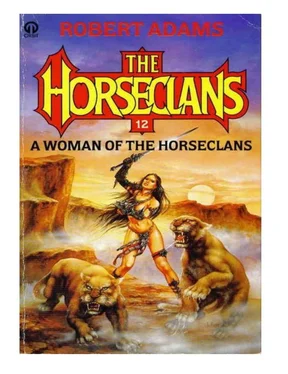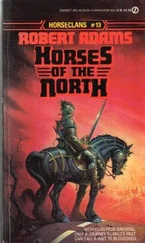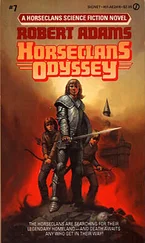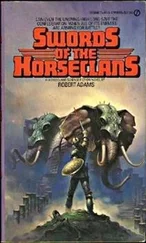Robert Adams - A Woman of the Horseclans
Здесь есть возможность читать онлайн «Robert Adams - A Woman of the Horseclans» весь текст электронной книги совершенно бесплатно (целиком полную версию без сокращений). В некоторых случаях можно слушать аудио, скачать через торрент в формате fb2 и присутствует краткое содержание. Жанр: Фантастика и фэнтези, на английском языке. Описание произведения, (предисловие) а так же отзывы посетителей доступны на портале библиотеки ЛибКат.
- Название:A Woman of the Horseclans
- Автор:
- Жанр:
- Год:неизвестен
- ISBN:нет данных
- Рейтинг книги:4 / 5. Голосов: 1
-
Избранное:Добавить в избранное
- Отзывы:
-
Ваша оценка:
- 80
- 1
- 2
- 3
- 4
- 5
A Woman of the Horseclans: краткое содержание, описание и аннотация
Предлагаем к чтению аннотацию, описание, краткое содержание или предисловие (зависит от того, что написал сам автор книги «A Woman of the Horseclans»). Если вы не нашли необходимую информацию о книге — напишите в комментариях, мы постараемся отыскать её.
A Woman of the Horseclans — читать онлайн бесплатно полную книгу (весь текст) целиком
Ниже представлен текст книги, разбитый по страницам. Система сохранения места последней прочитанной страницы, позволяет с удобством читать онлайн бесплатно книгу «A Woman of the Horseclans», без необходимости каждый раз заново искать на чём Вы остановились. Поставьте закладку, и сможете в любой момент перейти на страницу, на которой закончили чтение.
Интервал:
Закладка:
A nude woman strode over to the two of them, the ever-present wind tugging at her still-dripping black hair. For all that Bettylou was certain she must be at least as old as the girl’s own mother, the body looked far more youthful, radiant in health, with little sag to the breasts and skin that, where wind and sun had not had their way with it, was even fairer than Bettylou’s own.
She came to a stop between Tim and Bettylou and, while squeezing rivulets of water from handsful of her long hair, began to speak in a voice that the girl remembered from the previous night.
“Well, you all woke her up, did you, despite my admonitions? Ah, the more fool I to expect that any of you know what working quietly means. You make more noise than a cattle stampede, I’d swear. I could hear you all thumping and bumping and huffing even while I was inside the sweat yurt!”
“But, Mother,” said Tim, “my wife would have been awakened in any ease when I bore her out of the yurt.”
Lainuh Krooguh sighed. “Did I not clearly recall the birthing of you, Tim, I’d wonder if you truly were my son, at times like this, anyway. What need was there to carry your wife out of the yurt at all? All that was needed was to have lifted the yurt from over her, carried it to the new location marked out this morning and refurnished it. Then you could have come back and fetched Bettiloo here, and she would have had much more sleep. Did no one of you think of so doing the job?” She sighed again, gustily, and shook her damp head, adding resignedly, “No, I suppose not. I thank Sun and Wind I’m here to think for you all.”
Turning her piercing blue eyes on the recumbent girl, she spoke again in the brisk but kindly tone of the night before. “So you’re awake despite my best efforts. You must be wolf-hungry, and, well as I know my household, it will take them until at least dark to get the yurt moved and decently set up again. So get you up—if you need help in walking, Tim is here; for all else he and his siblings lack, they are all strong as bulls—and we’ll stroll over to my brother’s yurt for a bit of Chief Krooguh’s vaunted hospitality.”
Dik Krooguh sat on his sleeping-rug, still wearing most of his feast finery. He looked as if he should have been buried days earlier. His face was gray and stubbled, his eyes were severely bloodshot, and the hands that held a tarnished cup of a medicinal tea were exceedingly tremulous. Moreover, he winced as from a buffet at even the tiniest noises.
Many of the other inhabitants of the yurt still were prone on their own sleeping-rugs, and of the few who were up, most looked little better than the chief, going about their tasks slowly, ineptly and with many a piteous moan.
Bettylou had never seen the like, and she mindspoke the unworded question to Lainuh, who beamed back. “Misuse, last night late, of several gallons of a restorative potion from the far south; it is prepared from a certain plant of the cactus family and is called taikeelah . Utilized properly, as the clan supply had been for some years, it is a valuable medicine, but guzzled in quantity as my brother and many of his household did last night, it brings on first gaiety, then deep sleep, then illness such as you see here.”
Striding over to where the chief unsteadily sat, heedless of what or on whom her bootheels fell, Lainuh squatted beside her crapulous brother, took the silver cup from his weak grasp and held it firmly to his lips until he had drained it to the dregs. A moment later, he began to gag, and taking his arm, she led him, stumbling, out of the yurt, leaving Bettylou to her own devices in the midst of sleeping or terribly hungover near-strangers.
“Oh, Wind and Sacred Sun, I’m dying. I know I’m dying, but it’s taking so long to die.” The bubbling, gasping half-moan emanated from a body lying at Bettylou’s very feet.
Kneeling, the girl placed a hand on the sufferer’s forehead and found it hot, while the breath that wafted up into her face was foul, hot and rank.
She looked around her to find that she was now the only erect occupant of the yurt, the only soul available to give aid or bare comfort to the obviously ill—possibly, deathly ill—man. So she set about it forthwith.
As in the Morai yurt, so in this one; several canvas buckets were hung from the upper framework, and she examined each in turn until she located one that contained water, then searched among the dim clutter until she located a rectangle of cloth and a reasonably clean horn cup.
With the one soaked, then wrung out and the other filled with water, she picked her way among the recumbent bodies back to the side of the ill man, He still moaned weakly, though he had not moved an inch since she had left his side.
He gasped, then groaned when she laid the damp cloth on his fevered brow, his lips moved as if in speech, but no sound issued forth, and she was too preoccupied just then to try a mental probe of his mind with her newfound talent for such.
Kneeling beside her patient. Bettylou propped his head up on the side of her knee and her free hand, then held the horn cup of water to his dry lips, but so maneuvering the vessel that he needs must sip rather than gulp the tepid fluid. When he had drained the cup, she carefully lowered his head and wiped his face with the damp cloth before replacing it on his brow.
“… too good to me.” the man uttered half-audibly. “… best slave girl a man ever had. She was right, you know, Dahnah, dainmit, she’s most always right. Shouldn’t have drunk that vile Mehkikuhn concoction last night, not the first jug of it. But, hell. Dik is our chief, after all, and when he’s of a mind to imbibe, he will have company.
“Where is herself, Dahnah? I’ll bet she’s fit to be tied this morning.”
The croaking voice was in no way familiar; nonetheless, Bettylou realized from the words spoken that this patient of hers could be none other than her new father-in-law, Djahn Staiklee. he who had voiced so many vehement objections to her marriage into his family.
“I am not your slave woman, Mr. Staiklee,” she said finally. “I am Bettylou Hanson, now wife of your son, Tim. Your slave woman is helping to move your yurt just now; your wife, Lainuh, has taken Chief Dik Krooguh outside to care for his illness.”
“I hope he dies this moming,” snarled Staiklee viciously. “And if his hangover is one tenth pan as bad as is mine own, he just might. I can now understand why the traders call that damned taikeelah stuff ‘popskull,’ indeed I can.
“And the old bugtit would mix it measure for measure with berry wine and drink it, yes he would, and he would chivvy every one of us into joining him in his suicidal madness, oh yes. I take back my words; I hope he doesn’t die this day—a mere death is too good for the likes of him.
“So; herself is caring for him, eh? That’s typical, to be expected, that she would ignore me, her own husband, to give her comforts to Dik, instead. Her damned brother has always been of far more importance to our Lainuh than have I or her children or her grandchildren or anyone else, for that matter. Yet she begrudges me my one, single concubine, Dahnah, and will not hear any mention of my buying another. She treats me most unfairly, treats me like a … a …”
“I treat you a damned sight better than you have ever deserved, Djahn Staiklee!” snapped Lainuh’s deep voice from behind Bettylou. “I know that you envy, have always envied, the time I spend with Dik, but I care not how much you pout and natter on that account. Dik is my brother and I love him, and even if I did not love him, even if we two were not so closely related, still is he the chief. He has been and still is a good chief for our clan, but he is aging, is no longer in good health for all of his robust appearance, and I worry about him, as should you and everyone else.
Читать дальшеИнтервал:
Закладка:
Похожие книги на «A Woman of the Horseclans»
Представляем Вашему вниманию похожие книги на «A Woman of the Horseclans» списком для выбора. Мы отобрали схожую по названию и смыслу литературу в надежде предоставить читателям больше вариантов отыскать новые, интересные, ещё непрочитанные произведения.
Обсуждение, отзывы о книге «A Woman of the Horseclans» и просто собственные мнения читателей. Оставьте ваши комментарии, напишите, что Вы думаете о произведении, его смысле или главных героях. Укажите что конкретно понравилось, а что нет, и почему Вы так считаете.












